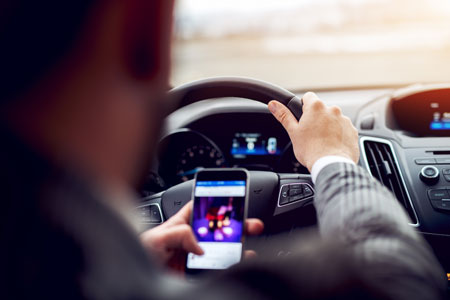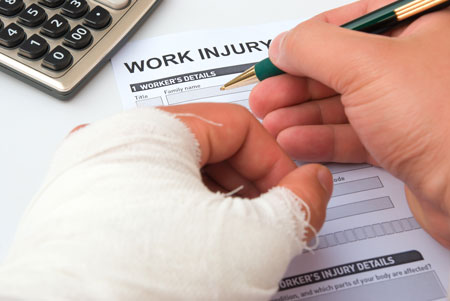REPORT: DISTRACTED DRIVING DEATHS ON THE RISE
A new report issued by the National Highway Traffic Safety Administration shows that the number of fatal crashes in the U.S. caused by distracted driving increased during the first year of the global pandemic, despite less traffic on the road.
According to the NHTSA, there were 38,824 fatalities in traffic accidents in 2020, an increase of more than six percent from 2019. That figure includes 3,142 deaths resulting from “distraction-affected” incidents, in which drivers were talking on cell phones, texting, fiddling with climate, navigation, or audio controls, or otherwise not paying attention to traffic conditions. That’s an increase from 2,858 such deaths in 2018 and 3,119 in 2019.
In addition, an estimated 324,652 people were injured in 2020 in motor vehicle crashes involving distracted drivers. The problem is probably more widespread than the figures indicate, since most drivers won’t admit to texting or other distracted behaviors, and there may not be sufficient evidence in a fatal crash to determine if distracted driving was responsible.
Some other unsettling numbers:
- Cell phone use remains a major culprit in distracted-driving incidents, playing a role in 396 deaths in 2020.
- Teen drivers, those between the ages of 15 and 20, constitute the age group with the largest proportion of distracted drivers.
- Distracted drivers, their passengers, and other motorists aren’t the only ones at risk. In 2020 there were 587 “nonoccupants”—meaning pedestrians, cyclists, and others sharing the road—who were killed in distraction-affected crashes.
- It’s estimated that distracted driving plays a role in 87% of rear-end collisions, the most common type of accident.
WAYS TO FIGHT DISTRACTED DRIVING
The Colorado Department of Transportation recommends putting your phone in “do not disturb” mode and minimizing other distractions. Select your car’s climate, entertainment and GPS settings before you embark. Have a passenger designated to respond to calls or messages while you’re on the road, or pull over if you need to check phone notifications. Avoid using your phone and especially texting while driving.
And, if you see another vehicle moving erratically or exhibiting other signs of a dangerously distracted driver, don’t hesitate to call the Colorado State Patrol at *277 to report it. But pull over before making that call.
WHAT QUALIFIES AS A WORK-RELATED INJURY?
With few exceptions, employers in Colorado are required to carry workers’ compensation insurance, which is supposed to aid their employees if they suffer a work-related injury. But if you’re like most employees, you probably have little information about the kind of insurance your company has or what it covers.
What is a work-related injury? The term actually covers more types of mishaps than you may think. According to the U.S Occupational Safety and Health Administration, an injury or illness is considered work-related “if an event or exposure in the work environment either caused or contributed to the resulting condition or significantly aggravated a pre-existing condition.” But for purposes of workers’ comp cases, the definition is actually much simpler — and broader. Injuries are considered work-related if they arise from the normal course and scope of your employment.
Many work-related injuries are associated with industrial accidents — a broken arm from a fall, for example. But the injury may not be identified with a single incident. It may develop over time, such as carpal tunnel syndrome or some other form of repetitive strain injury, or a respiratory disease resulting from long-term exposure to harmful chemicals in a manufacturing plant.
The injury doesn’t have to occur in the workplace in order to be work-related. If you’re on the road a lot for your job, injuries stemming from a traffic accident may be covered by worker’s comp, provided that you were doing something connected with your job at the time of the incident. If you attended a company party at a restaurant and ended up with food poisoning, that may also be considered work-related. An injury that occurs while meeting with clients, or while on break in the company cafeteria, or an old back injury aggravated by lifting too many boxes in the supply room — as long as they were sustained in the course of employment, they are probably all deemed work-related.
There are exceptions, of course. Employees who were injured because they deliberately disregarded workplace safety rules, got drunk, or engaged in “horseplay” may not qualify for workers’ comp coverage.
DO I NEED TO HIRE A WORKERS’ COMP ATTORNEY?
Many workers’ comp claims are filed with no attorney involved. You may not need legal representation if the injury was minor, involved little or no lost work time, and your employer and you agree that the injury or illness was work-related. But if the injuries are severe or the circumstances of the accident are complicated or disputed, an experienced workers’ comp attorney can make a significant difference in how your case is handled and how it gets settled.
FREQUENTLY ASKED QUESTIONS ABOUT PERSONAL INJURY CASES
An injury in a car wreck can lead to frustration, worries over medical bills, and a lot of uncertainty. But it doesn’t have to be that way. Here are some of the most common questions we get from new clients and some basic answers. Every case is different, of course, but it’s our hope that taking a little mystery out of the subject with this FAQ can make the journey a lot less painful.
- Do I need a personal injury lawyer?Many people think that because the accident was “minor,” they can obtain a fair settlement on their own. But it makes sense to consult with a personal injury attorney before signing your rights away–especially if the consultation is free and doesn’t obligate you in any way. Even in what may seem like a simple case, many factors—such as a dispute over liability, the involvement of multiple parties, serious injuries or disability requiring costly treatment, or an insurance company operating in bad faith—can present challenges that are best handled by an experienced personal injury attorney.
- Does it make sense financially to hire a personal injury lawyer?A study of insurance payouts in 6000 accident cases showed that claimants who hired an attorney received settlements that were, on average, 40 percent higher than those paid to people who didn’t have an attorney. In a comparison of settlements received by accident victims for the same type of injury, people represented by an attorney recovered approximately 3.5 times more money than those without an attorney.
- How do I pay for a personal injury lawyer?Most firms that focus on personal injury cases proceed on a contingency basis; they don’t get paid unless you do, and that means they have no incentive to mislead you about whether you have a legitimate claim or not. The costs you are responsible for are outlined in the fee agreement you sign. At Franklin D. Azar & Associates, we offer a free, no-obligation initial consultation, so there’s really no downside in having your case evaluated by an experienced accident attorney.
- What should I expect in an initial meeting with a personal injury lawyer?You should take time before that meeting to gather as much relevant documentation as you have available, such as the accident report or photos taken at the scene. An attorney will want to review your insurance coverage, medical bills, any X-rays or other assessments of injuries, invoices or estimates for car repair and other property damage, witness statements, and so on. Your attorney will also want to learn how the accident has impacted your ability to work and your daily life, or any prior medical condition that an insurance company might “blame” for complications experienced after the accident.
- Will my personal injury case go to trial?More than 90 percent of personal injury cases don’t end up in a courtroom. The parties, their attorneys, and their insurance companies usually reach a resolution without a lawsuit ever being filed. Even if the case does result in litigation, the matter is often settled before trial, saving time and expense for everyone concerned. But if there are ongoing disputes about who caused the accident, conflicting witness accounts, or other factual issues, the competing claims may have to be thrashed out in court. A trial might also result if there’s an unresolvable dispute with an insurance company over what constitutes fair compensation for injuries resulting from the accident.
- How long will it take to reach a settlement in my personal injury case?There is no simple answer to this question. A settlement could take a matter of weeks, or months, or even years, although most cases settle in a year or less. The severity of the injuries involved plays a role, since it may take considerable time and various treatments or surgeries to determine the long-term prospects for recovery. Accident victims should be wary of accepting an insurance company’s initial offer of settlement without first consulting an attorney.
- How do I pay my medical bills while waiting for the settlement?Ultimately, the at-fault party is responsible for compensating you for the injuries you’ve suffered. But it can take months to reach a settlement with that party’s insurance company. In the interim, your treatment providers expect to be compensated immediately. Your first line of defense should be the insurance you already carry. If you have private health insurance or Medicare, it’s likely that coverage will be available for at least some of the medical costs associated with the accident. If you have medical payments coverage (also known as MedPay) as part of your auto insurance, that can cover health provider copays and deductibles that your private health insurance doesn’t. In many cases, health insurers will seek reimbursement for medical costs they’ve covered through a process known as subrogation; essentially, money that is awarded to you for medical costs as part of your settlement is then assigned to them. Or a medical lien might be filed by a physician or a hospital involved in treating your injuries. Your attorney can help you find the treatment providers you need and address how these providers will be paid — and may be able to negotiate the release of a medical lien for less than the total amount sought.
The Car Accident Lawyers At FDAZAR
For more than thirty years the attorneys at Franklin D. Azar & Associates have helped thousands of injured people obtain complete and timely compensation for their losses. Our proven track record and expertise have allowed us to grow into the largest personal-injury law firm in Colorado, with offices in Denver, Aurora, Thornton, Fort Collins, Greenwood Village, Colorado Springs, Pueblo, and Grand Junction.. If you’ve been injured in a bus, car, truck, or motorcycle accident, you may be entitled to compensation. Please call the car accident attorneys at FDAzar day or night at 720-372-1162, or contact us here for a free consultation and no-obligation evaluation of your case.
Join Frank Azars Monthly Newsletter
"*" indicates required fields




